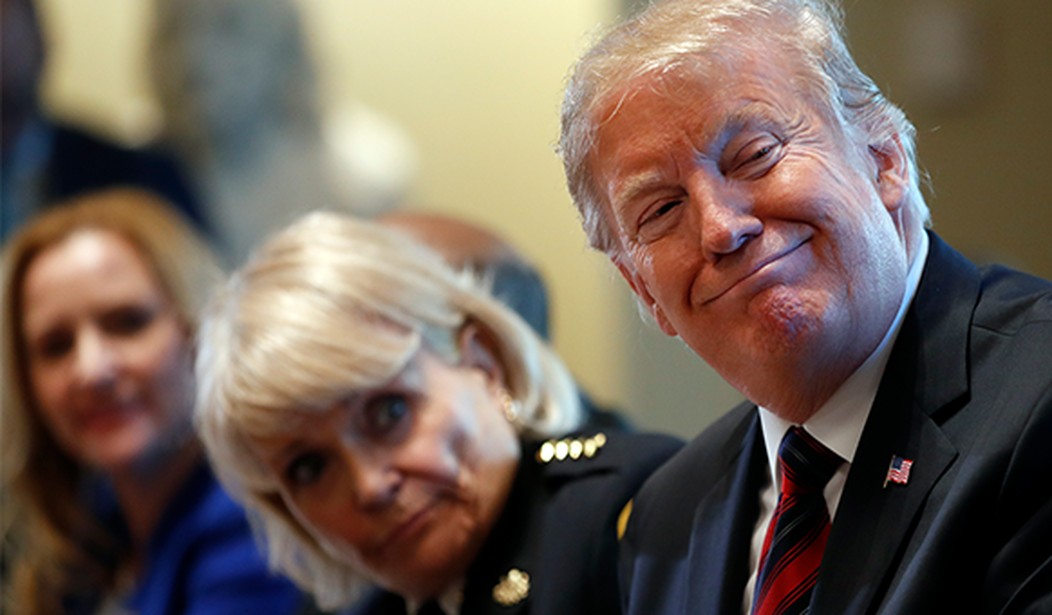What are Donald Trump's chances for re-election in 2020?
If history is any guide, pretty good.
In early 1994, Bill Clinton's approval rating after two years in office hovered around a dismal 40 percent. The first midterm elections of the Clinton presidency were an utter disaster.
A new generation of younger, more conservative Republicans led by firebrand Newt Gingrich and his "Contract with America" gave Republicans a majority in the House of Representatives for the first time in 40 years. Republicans also picked up eight Senate seats in 1994 to take majority control of both houses of Congress.
It was no wonder that Republicans thought the 1996 presidential election would be a Republican shoo-in. But Republicans nominated 73-year-old Senate leader Bob Dole, a sober but otherwise uninspired Washington fixture.
By September of 1996, "comeback kid" Clinton had a Gallup approval rating of 60 percent. Dole was crushed in an Electoral College landslide.
Barack Obama was given a similarly dismal prognosis after the 2010 midterms, when Democrats lost 63 House seats and six Senate seats. Republicans regained majority control of the House, though Democrats clung to a narrow majority in the Senate. At the time, Obama had an approval rating in the mid-40s.
Republicans once again figured Obama would be a one-term president. Yet they nominated a Dole-like candidate in the 2012 election. Republican nominee Mitt Romney had little appeal to Republicans' conservative base and was easily caricatured by the left as an out-of-touch elite.
By late 2012, Obama's approval rating was consistently at or above 50 percent, and he wound up easily beating Romney.
Recommended
What is the significance of these rebound stories for Trump, who had a better first midterm result than either Clinton or Obama and similarly low approval ratings?
People, not polls, elect presidents.
Presidents run for re-election against real opponents, not public perceptions. For all the media hype, voters often pick the lesser of two evils, not their ideals of a perfect candidate.
We have no idea what the economy or the world abroad will be like in 2020. And no one knows what the country will think of the newly Democrat-controlled Congress in two years.
The public has been hearing a lot from radical new House representatives such as Alexandria Ocasio-Cortez (D-N.Y.) and Rashida Tlaib (D-Mich.). Their pledges to deliver "Medicare for All," to phase out fossil fuels and to abolish the Immigration and Customs Enforcement Service are occasionally delivered with snark. Tlaib recently used profanity to punctuate her desire to see Trump impeached.
But much of the public supports Trump's agenda of deregulation, increased oil and gas production, getting tough with China on trade, and stopping illegal immigration.
What if the Democrats impeach Trump, even knowing that a Republican Senate would never convict him?
When Republicans did that to Bill Clinton, his approval rating went up. Some Republican senators even joined the Democrats in the effort to acquit Clinton. As a reward for the drawn-out drama around the impeachment, Republicans lost seats in both the 1998 and 2000 House elections.
We still don't have any idea whom the Democrats will nominate to run against Trump. Will they go the 1996 or 2012 Republican route with a predictable has-been such as Joe Biden, who will turn 78 shortly after the 2020 election?
Well-known candidates from the Senate such as Walter Mondale in 1984, Dole in 1996, John Kerry in 2004, John McCain in 2008 and Hillary Clinton in 2016 have a poor recent track record in recent presidential elections. They are usually nominated only by process of elimination and the calling in of political chits rather than due to grassroots zeal.
Democrats can continue their hard-left drift and nominate socialist Bernie Sanders, or they can try again to elect the first female president, either Kamala Harris or Elizabeth Warren, both of whom represent the far left.
But going to extremes did not work well in 1972, when leftist Democratic Sen. George McGovern was crushed by incumbent Richard Nixon. The Republicans learned that lesson earlier when they nominated Sen. Barry Goldwater in 1964 and were wiped out.
Whether or not they like Trump, millions of voters still think the president is all that stands between them and socialism, radical cultural transformation and social chaos.
Many would prefer Trump's sometimes-over-the-top tweets and hard bark to the circus they saw at the Brett Kavanaugh nomination hearings, the rantings of Ocasio-Cortez, or the endless attempts to remove Trump from office.
What usually ensure one-term presidencies are unpopular wars (Lyndon Johnson) or tough economic times (Jimmy Carter, George H.W. Bush).
If Trump avoids both, perhaps a majority of voters will see him as political chemotherapy -- occasionally nausea-inducing but still necessary and largely effective -- to stop a toxic and metastasizing political cancer.
(Editor's note: Last week's Victor Davis Hanson column stated that there are an estimated 11 million to 13 million Mexican citizens living in the United States illegally. The latest estimate from the Pew Research Center put that number at 10.7 million in 2016, and Mexican citizens comprise a little more than half of that total. Hanson, however, cites a more recent 2018 Yale-MIT study that estimated a much larger pool of 22 million foreign nationals living illegally in the United States, or about 12 million Mexican citizens.)

























Join the conversation as a VIP Member